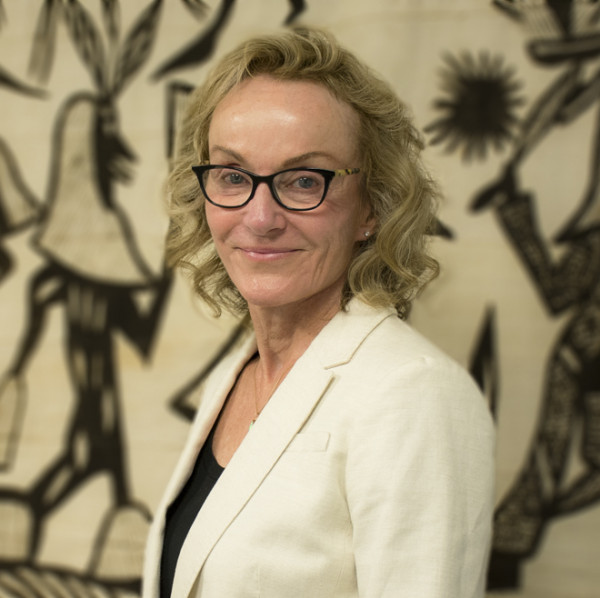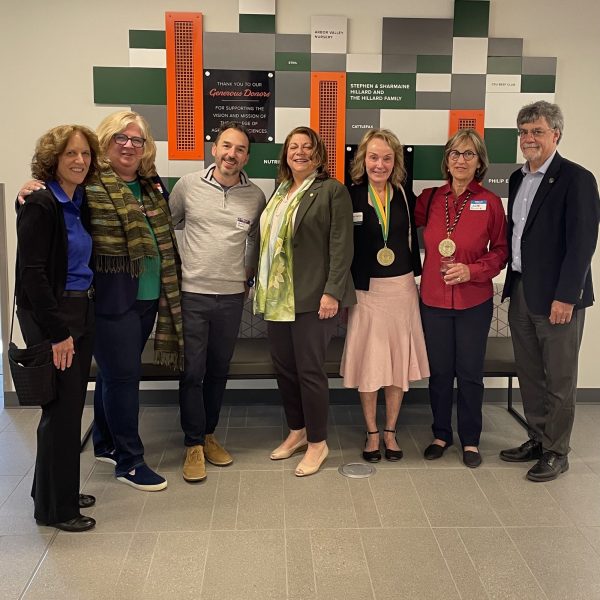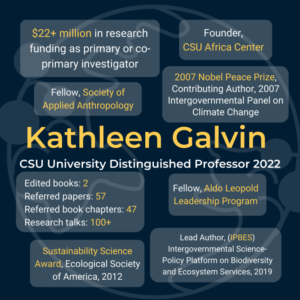
A pioneer in interdisciplinary anthropological research, Kathleen Galvin has been recognized as a University Distinguished Professor at Colorado State University.
Galvin, who has been faculty since 1994 and received her Anthropology bachelor’s (’71) and master’s (’79) degrees from CSU, studies human impacts and adaptations to the environment and climate change, with a focus on pastoralists, farmers and herders who live and work in arid regions, from Africa to Central Asia to the American West.
Drawing from her education and experiences in both anthropology and ecology, Galvin’s research and career have weaved together social, biological, and ecological survey methods and data and anthropological and ecological theory to understand interactions between people and nature.
“Some of the most important and timely research topics are social-ecological in nature, in part because we work with people who live directly from the land and the services the lands provide are changing” Galvin said. “The most interesting interactions that I have in the scientific world and in my research are with collaborators because if you have a diverse group of people in the room – whether it’s pastoralists from around the world or researchers from different disciplines – there are a lot of synergies and interesting ideas that emerge that otherwise wouldn’t.”
Respected by her peers

Eduardo Brondizio, professor of Anthropology at Indiana University, called Galvin, “one of the most respected and internationally recognized anthropologists working on human-environmental interaction today, from developing participatory approaches in collaboration with pastoralists’ communities in different parts of the world to leading international research networks and journals to contributing to international environmental assessments panels.”
University Distinguished Professor is the highest academic honor given to faculty at CSU, with individuals nominated by colleagues. Winners are selected based on their outstanding scholarship and achievement, after an extensive review and with approval from the university president.
“I am thrilled by this honor, and I am so grateful to the community of scholars who nominated and supported the application,” Galvin said. “I was so surprised!”
A distinguished career

At CSU, Galvin previously served as Chair of the Anthropology Department (2002-2009) and Associate Director of the Natural Resource Ecology Lab (2001-2002). She founded and serves as director of the Africa Center (2014-present) to foster collaborative research and engagement among scientists and institutions in Africa and the U.S. and helped establish the School of Global Environmental Sustainability. The College of Liberal Arts, the Graduate Degree Program in Ecology and Office of International Programs have all recognized Galvin’s career and contributions through past campus awards and distinguished titles.
Throughout her career, Galvin has published two edited books, over 100 referred papers and referred book chapters, and given more than a hundred talks at conferences, symposia and universities. As a lead and co-lead investigator, she has been awarded roughly $22 million in research grants and funding.
“Kathy’s impact on the department and university is enormous – she charted a course and developed one of the first models for successful transdisciplinary research at the university,” said Mica Glantz, professor and chair of the Department of Anthropology and Geography. “Her research and related policy work have had a positive impact on our discipline as well as the communities in which she works. She has long been an excellent example of how to combine and balance significant research with teaching and mentoring and, at the same time, making important contributions to the university with her service. Kathy is incredibly deserving of this award.”
The start of something big
Galvin began her research career as a doctoral student in Kenya’s Turkana Basin following a lifelong desire to visit and work in Africa. Galvin was interested in studying the nutritional status and health of pastoralists who migrated with their livestock in the region following seasonal environmental changes and cycles. Her interdisciplinary background and interests led her to study land use change, diet and nutrition, and climate variability to assess how communities endure and adapt to environmental changes in drylands.
“We were working on climate change issues before that was a term,” Galvin recalled. “We were looking at how people adapted to a very harsh environment where rainfall was about 150 millimeters per year over two short rainy seasons, so we were looking at climate variability and its effects on human wellbeing before that became part of the lexicon.”
Over time, Galvin teamed up with ecologists, modelers, remote sensing and GIS experts, and local communities to understand human-ecological problems and interactions more deeply.
“Asking the kinds of questions that are important today are complex and they really require an integrated approach,” Galvin said.
Through her dedication to working across disciplines, Galvin helped validate and advance anthropologists’ place within the fields of conservation and global environmental change, demonstrating the value of cultural anthropology frameworks and ethnographic methods.
“We collectively owe her an enormous debt for her intellectual leadership in making anthropology relevant and, in fact, indispensable for other environmental disciplines,” said Colin West, associate professor of Anthropology at University of North Carolina, Chapel Hill.
Galvin has also been at the forefront of new collaborative approaches to research taking place across cultures. For a long time, Western researchers have entered rural, foreign lands and often treated people as passive subjects to be studied. Galvin and others, working in Africa and around the world, have forged models that place local people as collaborators and co-investigators on research and findings. Through grants and programs including initiatives through the Africa Center, Galvin and colleagues at CSU have hosted herders and pastoralists from Africa and Asia for workshops and conferences on campus and elsewhere, which has led to exciting developments in collaborative management and research.
“I remember sitting in a series of workshops and focus groups in the mid-2000s where pastoralists from all over Kenya convened and we were asking the question of how people were perceiving environmental change and climate change and what they thought needed to be done to address it,” Galvin recalled. “I remember sitting back in one of those workshops and saying, ‘Oh my gosh, I am witness to a cadre of pastoralists who are in charge, know the issues and are networking among themselves for solutions.’ That was a real turning point for me, and I said, ‘I will never go back to just collecting data.’”
An impact beyond the field
In her current research funded by Pew Charitable Trust, she and postdoctoral fellow Jasmine Bruno are assessing nature’s contributions to local communities in the U.S.
Galvin’s legacy has also extended beyond the field as a leader on international collaborative research networks and global science panels. She was among the scientific team that wrote the Intergovernmental Panel on Climate Change report that won the 2007 Nobel Peace Prize. From 2016 to 2019, she served as a lead author of the Intergovernmental Science-Policy Platform on Biodiversity and Ecosystem Services Global Assessment, a first-of-its-kind review that explicitly recognizes diverse worldviews, values and knowledge systems of ecosystem services.
At CSU, Galvin has advised and collaborated with hundreds of students and peers and introduced many to her work.
“I love working with and mentoring graduate students and seeing them succeed and seeing those a-ha moments,” she said.
Many former students have followed her path into academia, applied anthropology and conservation, and they are among practitioners and researchers dedicated to inter- and transdisciplinary approaches.
“I have been immensely privileged to be Kathy’s Ph.D. student and, later, research collaborator,” said Joana Roque de Pinho, a researcher at Instituto Universitário de Lisboa, Centro de Estudos Internacionais, in Lisbon, Portugal who studied with Galvin at CSU. “Kathy, through her teaching and mentorship, and also her humanity, has played a critical role in shaping my critical thinking, as well as my fieldwork and research leadership skills.”
Galvin is the second Anthropology and Geography faculty member recognized with this honor. Professor Emeritus Kate Browne won the award in 2019.
“It is an extraordinary privilege to have served the CSU community, my college, department, and students for the past 25-plus years,” Galvin said. “I intend to continue my research and scholarship and contribute to CSU under the UDP title.”